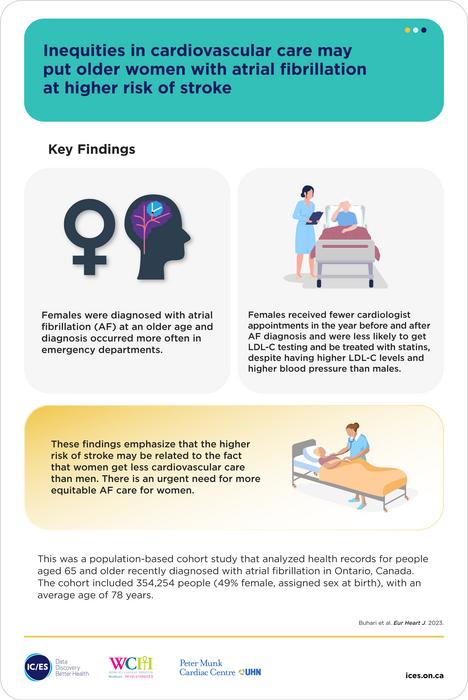Toronto, ON, August 30, 2023 – Higher stroke risk among females with atrial fibrillation may be related to sex-based disparities in cardiovascular care, according to a new study from Women’s College Hospital, the Peter Munk Cardiac Centre (PMCC) at University Health Network (UHN) and ICES.

Credit: ICES
Toronto, ON, August 30, 2023 – Higher stroke risk among females with atrial fibrillation may be related to sex-based disparities in cardiovascular care, according to a new study from Women’s College Hospital, the Peter Munk Cardiac Centre (PMCC) at University Health Network (UHN) and ICES.
Atrial fibrillation (AF) is a common type of irregular heart rhythm that is associated with a higher risk of stroke—after the age of 40, one in four strokes are caused by AF. Previous studies have found that female sex (assigned at birth) is a risk factor for AF-associated stroke. Recent research suggested that females are only at higher risk than males with AF if they have another factor predisposing them to stroke (such as older age, hypertension, or diabetes).
The reasons for this higher stroke risk in females has not been well-examined. The authors hypothesized this was because these risk factors were less well-treated in older females, rather than female sex intrinsically predisposing to this higher risk.
The population-based cohort study, published in the European Heart Journal, analyzed health records for people aged 65 and older recently diagnosed with AF in Ontario, Canada. The cohort included 354,254 people (49% female), with an average age of 78 years. The study was made possible through the Early Career Women’s Heart and Brain Health Chair and a National New Investigator Award from the Heart and Stroke Foundation of Canada.
“After taking into account the age of the individual and differences in cardiovascular care, the data show that stroke risk was similar between males and females under the age of eighty, but that female sex was an independent risk factor over the age of eighty” says lead author Hifza Buhari, family medicine resident at the University of Toronto and former Temerty medical student at Women’s College Hospital. “Females tend to be diagnosed with atrial fibrillation at older ages, and they may not be receiving adequate monitoring or treatment to reduce their stroke risk.”
The data also show that, compared to males:
- Females were diagnosed more often in emergency departments (30% versus 25% for males)
- Females received fewer cardiologist appointments, both in the year before (12% versus 17%) and after (31% versus 37%) AF diagnosis.
- Females were also less likely to get LDL-C testing and be treated with statins, despite having higher LDL-C levels and higher BP than their male counterparts.
“Equalizing cardiovascular care for males and females is an important step towards healthier hearts and lives for everyone,” says senior author Husam Abdel-Qadir, cardiologist at Women’s College Hospital and Peter Munk Cardiac Centre, University Health Network, and scientist with Women’s College Research Institute, Ted Rogers Centre for Heart Research, and ICES. “By addressing sex inequities, we can increase the likelihood that every individual receives the best chance at a heart-healthy future.”
One limitation of the data is that the researchers could not account for variables such as race, AF type or severity, and other clinical factors, which may had led to an underestimation of inequities in cardiovascular care that disproportionately affect older females.
“This study is another reminder that heart disease and stroke are not male diseases. Despite there being widespread appreciation that females with AF are at higher stroke risk than males, they are getting less cardiovascular care with real consequences. These data emphasize that females, particularly those at older ages, require appropriate care to reduce their risk of these serious diseases,” says Dr. Abdel-Qadir.
The study, “Stroke risk in women with atrial fibrillation” was published in European Heart Journal. Buhari H, Fang J, HanL, Austin PC, Dorian P, Jackevicius C, et al. Stroke risk in women with atrial fibrillation. Eur Heart J 2023: doi: 10.1093/eurheartj/ehad508 https://academic.oup.com/eurheartj/article-lookup/doi/10.1093/eurheartj/ehad508
The Peter Munk Cardiac Centre (PMCC) opened in 1997 through the generous support of Peter and Melanie Munk. A global leader in cardiovascular care, with internationally-renown medical expertise, PMCC has some of the best patient outcomes in the world and is home to many world firsts that span cardiac and vascular research and discoveries. Canada’s premier cardiac centre is part of the University Health Network (UHN) and located at the Toronto General Hospital, and the Toronto Western Hospital, in Toronto, Ontario, Canada. For more information, visit: www.petermunkcardiaccentre.ca
ICES is an independent, non-profit research institute that uses population-based health information to produce knowledge on a broad range of health care issues. Our unbiased evidence provides measures of health system performance, a clearer understanding of the shifting health care needs of Ontarians, and a stimulus for discussion of practical solutions to optimize scarce resources. ICES knowledge is highly regarded in Canada and abroad, and is widely used by government, hospitals, planners, and practitioners to make decisions about care delivery and to develop policy. In October 2018, the institute formerly known as the Institute for Clinical Evaluative Sciences formally adopted the initialism ICES as its official name. For the latest ICES news, follow us on Twitter: @ICESOntario
About Women’s College Hospital
For more than 100 years Women’s College Hospital (WCH) has been developing revolutionary advances in healthcare. Today, WCH is a world leader in health equity and Canada’s leading academic ambulatory hospital. It focuses on delivering innovative solutions that address Canada’s most pressing issues related to population health, patient experience and system costs. A multidisciplinary research institute, the Women’s College Research Institute (WCRI) is one of only a few hospital-based research institutes worldwide to focus on health equity. WCRI leads innovative, high impact health research that changes practice, changes policy, and changes lives. www.womenscollegehospital.ca
Journal
European Heart Journal
DOI
10.1093/eurheartj/ehad508
Method of Research
Observational study
Subject of Research
People
Article Title
Stroke risk in women with atrial fibrillation
Article Publication Date
30-Aug-2023




